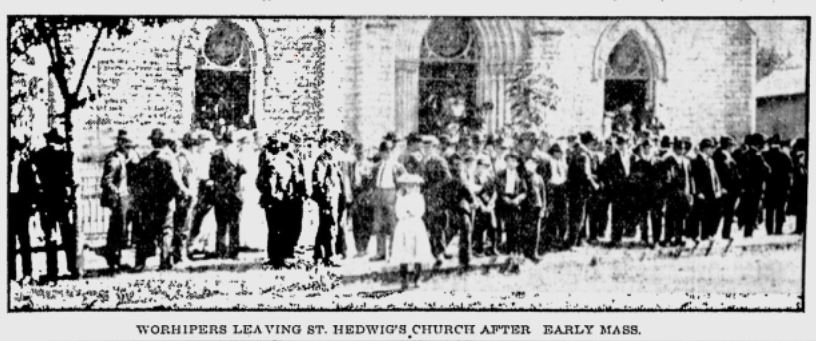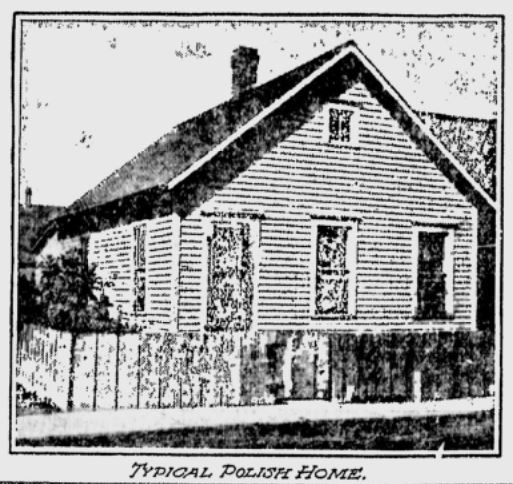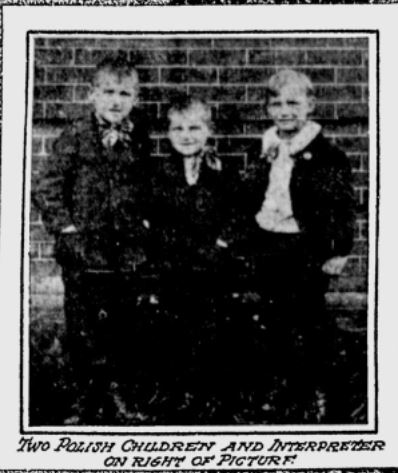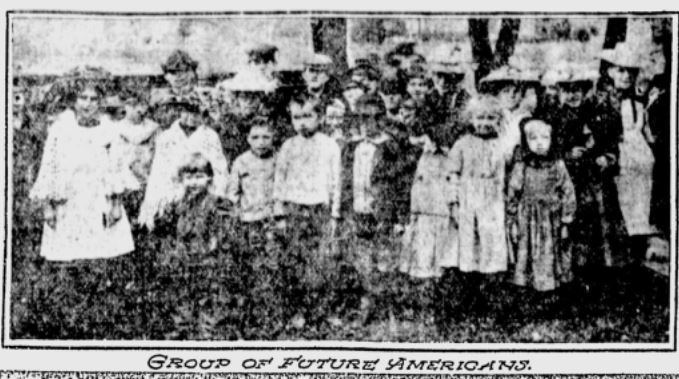How Toledo Makes Americans
Or my subtitle: How Polish immigrants were viewed at the start of the 20th century
Old newspapers can be interesting to read. Plenty of history to read and understanding how current events of 50, 100, 150 years ago were interpreted by those who experienced it brings a depth of understanding. This story, published in the Toledo Sunday Times-Bee on 4 October 1903, placed prominently on the front page of the third section, is interesting in how the writer viewed Poles in Toledo. The original can be located here: Google Newspaper Archive. Please note that I have transcribed it exactly as printed, I do not believe the author double-checked names for correct spellings.
I might say in beginning this article that “when night gathers up her sable garments and retreats before the ardent glances of advancing day” but I won’t. I’ll only say, when the very first car of the sleppet-de-bag variety which traverses Langrage street, breaks loose from the car barns, hurls itself into the business of the new day and races madly up to the limits of the city, ripping a long strip out of the silence of the early morning, Polack town springs to life. Earlier even than the cars the swallows have resumed their neighborhood rows; quite as early as Wogniack’s gander sallies forth to wrest an applecore from the hostile forces of Picoriaks ducks; as the buzzing of the poor man’s carriage melts in the distance the air takes a new vibration from the clamorous peeping of the insistent and predatory broiler—alas chicken; little feathers of smoke curl out of the chimneys—there is a growing smell of coffee and onions; men are stamping their feet into their heavy boots; stout ladies—casting to the winds the conventions of this too exacting America—repair their little forgetfulnesses of the previous days and do their early morning shopping in all the untrammeled simplicity of their feet. Here and there men are gliding off swiftly and silently on their bicycles to take the places at the wheels of progress of those who, having toiled all night, are now, with eyes and teeth gleaming wildly out of sooty faces, wending their way homeward to bed and a dayI might say in beginning this article that “when night gathers up her sable garments and retreats before the ardent glances of advancing day” but I won’t. I’ll only say, when the very first car of the sleppet-de-bag variety which traverses Langrage street, breaks loose from the car barns, hurls itself into the business of the new day and races madly up to the limits of the city, ripping a long strip out of the silence of the early morning, Polack town springs to life. Earlier even than the cars the swallows have resumed their neighborhood rows; quite as early as Wogniack’s gander sallies forth to wrest an applecore from the hostile forces of Picoriaks ducks; as the buzzing of the poor man’s carriage melts in the distance the air takes a new vibration from the clamorous peeping of the insistent and predatory broiler—alas chicken; little feathers of smoke curl out of the chimneys—there is a growing smell of coffee and onions; men are stamping their feet into their heavy boots; stout ladies—casting to the winds the conventions of this too exacting America—repair their little forgetfulnesses of the previous days and do their early morning shopping in all the untrammeled simplicity of their feet. Here and there men are gliding off swiftly and silently on their bicycles to take the places at the wheels of progress of those who, having toiled all night, are now, with eyes and teeth gleaming wildly out of sooty faces, wending their way homeward to bed and a day of sleep.
The slappet-de-bang car travels back again. Groups of men are gathered at every corner. Some wish me a pleasant good morning; most of the view with curiosity and evident suspicion. A person who is palpably a prowler with intentions. As I am. I am watching to see how Polack town wakes up.
I went back there at three o’clock in the afternoon. What struck me most was that apparently no whisper of a race suicide has yet created a ripple in the domestic atmosphere of Polack town. This year’s crop of babies is equally marvelous and beautiful. Go up there and see for yourself how, despite the rush for opulence, despite the claims of society, in defiance of his general unwelcomeness in most of the homes today, my Lord Baby still rolls up and down in his chariot, omniscient and omnipresent, in Polack town. The chariots, to be sure, vary in comfort and expensiveness-they are from soap boxes on home made wheels to the greater elegancies of a barouche; it is sometimes the prettiest babies who have the homeliest vehicles, but it is not their life full of dispensations and compensations like this?
Some of these chariots have cavalcades of attendants, postilions, outriders and footmen, one has to step off the sidewalk and allow them to pass.
“Hello,” said one affable specimen of Polish Juvenility seating himself on the sidewalk and gazing at me as one may with a pair of crosseyes. “Hello,” I answered in the same spirit of cordial Bohemianism, “what’s your name?” The easy familiarity with which that infant threw consonants about amazes even yet. I made him repeat his name several times hoping to learn to say it too, but I never could find out which was the right end at which to begin.
“Why aren’t you with the band?” I asked. He looked bashful; then he threw more consonants about. Evidently, he understood what I said, but “hello” was his whole repertory of expression outside of Polish. He removed himself from the sidewalk and backed carefully away. With the precincts of the paternal yard he made a wild dash for greater seclusion. Then I understood: there were deficiencies in his attire which made it undesirable for him ever to turn his back to what might prove to be unfriendly criticism.
Walenty Picoriak was organizing a band. Casimir Wegniack awarkened the harmonies of a piece of tin pipe. Ladislaus Zulmar toiled along with a discarded gasoline can for a bass drum, tied, somewhat insecurely, to that part of his anatomy which he was filling with green apples. Stanislaus Rowpolowski awoke the slumbering soul of a comb while Szcrzepan Kagomarek brought up the rear as the proud possessor of a fifteen cent drum.
It was Walenty’s mother who dis-organized the band. Swooping down upon its inspired leader she dealt two smashing blows upon the side of Walenty’s head. “You be shamed!” she said, casting a scorching glance at the astonished Walenty and an apologetic one at me. “You be shamed; you be such dirty kid; don’t you have no clean blouse?” Walenty retired. She addressed herself to me. “Always my man say ‘surely you don’ have nodings to do all day, surely dis mooch you can do is you can to keep dis boy clean, de mans dey tink de womans don’t have nodings to do-de mans dey don’ know,” she shakes her head solemnly. I shake mine too, but there she doesn’t know that by my watch it is an hour and a quarter since she in her sky-blue kimono and Mrs. Kubinsky in hers of mustard yellow leaned up against the fence and began to talk.
Walenty looks at me across the gate with sad eyes. He had felt almost positive of of my sympathy with his musical efforts. He is a pretty boy with low, level, penciled eyebrows over eyes which have the incurving eyelid of Slavonic races, a physical characteristic which almost all these children have; his skin is nut brown and his small turned nose sprinkled with tiny freckles. We smile to one another and Walenty knows by the same token, that once upon a time, I too—but oh, dear me how long ago that is!
A dumpy little woman stands at the corner of the street; her skirt is short and she wears a multitude of petticoats; her pleasant face is surrounded by the ruffle of her snow white cap, and as an extra submission to decorum, a three-cornered black shawl surmounts the cap. These snow white caps, I am told, are indicative of widowhood. I am inclined to think she is one of those amiable and well-intentioned women who in considerable numbers in this neighborhood announce their readiness to assist—not so much in the shuffling off, as in the taking on of this “mortal coil.”
I yearn to talk to her far more than with any of these hybrid Americans, who gossip over the fences in green or yellow or blue kimonos. I want to meet the grandfathers and grandmothers—those who being too old to adapt themselves entirely to the ways of this prosperous land, still murmur in their hearts “there is a land of every land the best” or “there doth the dust of my dear ones lie—in the old graveyard.”
It was the search for old people which took me to St. Hedwig’s, the handsome granite church which its rectory is such a credit to Polack town. I crept in there somewhat late for the service once Sunday morning. Of course I did not understand a word that was said. But all the same I made up my mind that the text of the sermon had been that verse which deals with the difficulties of the rich man and the camel respectively—for there was such an air of mute stubbornness and incredulity on the faces of the congregation.
In one of the recent problem stories the heroine, a coster girl in despair at her lack of ability to adapt herself to new surroundings, cries “oh w’y didn’t you ketch me w’en I was a kid?” Curious to see what one did with a Polack caught as a kid, I paid a visit to the Parkland school on Lagrange street. I was so fortunate as to find exactly the material for which I was looking, in two Polish children, brothers, who were putting in their second day at school, after being only one month in this country. They, with the good-looking, well-dressed little fellow who efficiently discharged the duties of interpreter, were star performers for my benefit. The brothers were six and eight respectively, the interpreter seven. “In the first place,” I asked the smiling teacher, “how in the world do you ever get hold of their names?” She showed me the cards upon which the names are written by those who really know. “You see,” she said, “many are already Americanized—probably Stanley, for instance, should be Stanislaus, and while I do not guarantee that I give their patronymics correct pronunciation still they soon learn to know who is mean even from what be my mispronunciation.” The room and the children themselves were all delightfully clean, the little strangers being the only two at whose dress one might cavil and even this was on the score of unfitness for the season, rather than anything else. The younger of the two wept copious tears and sobbed heartrending sobs. He used his dirty little fists to swab off the floods of water pouring down his face. The result was disastrous. “He must be so warm,” said the teacher, “I wonder if I can get him to take off his coat,” but he clung to his coat as firmly as ever Kosciusko’s adherents clung to their hopes of freedom. Liberty has ever been the watchword of the Pole. “Look, dear,” the teacher firmly and kindly held up his grimly little paws before his face, “tomorrow I want you to come with nice clean hands.” He nodded slowly and perhaps with some dim comprehension of what was said. I wondered how often this would require to be repeated before the lesson would begin to work.
“I suppose you would like, most of all, to hear the class in which these children are?” Upon my acquiescence in this courteous suggestion, the teacher called the children to the floor. Polish exile No. 2 was again in tears. “I wonder if he can be sick,” the teacher remarked, looking puzzled. “Stanley, come and ask him if he is sick.” Blushing, Stanley addressed some words to him which sounded like the spurting of a water tap. Polish exile spurted back again. No he wasn’t sick, but he was suffering from the well-meant tap which his nearest neighbor had given him, merely a reminder that he had to follow his class to the floor. The tap he had interpreted as another injustice to Poland. The words on the board were “Mamma, baby, see baby, mamma see.” It was explained to me that this would be only their second lesson on these worlds, which were being taught by sight. Upon being asked who could name these words the hands of the Polish exiles waved and wagged in the air with an enthusiasm equal to any. Being called upon the elder repeated the promptly and correctly, the younger with only one error, and this, despite the fact that he was once again, wrestling with a secret grief. The words were re-arranged into sentences. “I see mamma—I see baby—Mamma, see baby.” Again the Polish exiles emerged triumphantly from the test, the elder stealing a look at me of mingled pleasure and vanity. They were two bright looking boys, with the broad heads of intelligence.
“Come back again in a month,” invited the radiant teacher “and they will be reading English.” Who talks of obstacles in the face of the skill and patience of the American woman teacher.
If you will take the car at the corner of Summit and Cherry Streets at 6 p.m. or thereabout, you will ride home with the bread earners of Polack town. If you have on all your finery you won’t want to sit close to them, for they are covered with dust. Not the dust of agriculturalist, but the red metallic dust of those who help make the wheels go round. They do not look like agriculturalists—they have sharp eyes and the wide and bent or turned up nose of the alert, purposeful person. Anything but sodden material this—on the contrary one is bound to remember in looking at them that out of perfervid characteristics such as typified here, has been moulded some of the world’s greatest writers, musicians, patriots—and anarchists.
###
So, there’s the story of some of the early 20th century’s greats writers, musicians, patriots–and gasp–anarchists. From the perspective of an outsider. Poles and other European immigrants were looked upon with suspicion as they arrived in the US. Not only were there language barriers, but most immigrants from Poland other eastern or central European countries came with their Roman Catholic faith, which in Protestant America sometimes brought subtle but palpable derision or possibly fear. Despite this, Polish immigrants became great Americans and firmly held on to their faith and traditions. They helped build magnificent churches, they helped build the auto industry in Detroit and Toledo by providing a significant workforce, and they contributed greatly to American culture and politics. Each Pole who came to the US has a unique story and his or her path was shaped by significant historical factors.
A few photos were included with the story. They are poor scans, but they do give a glimpse of some of our ancestors’ lives.



